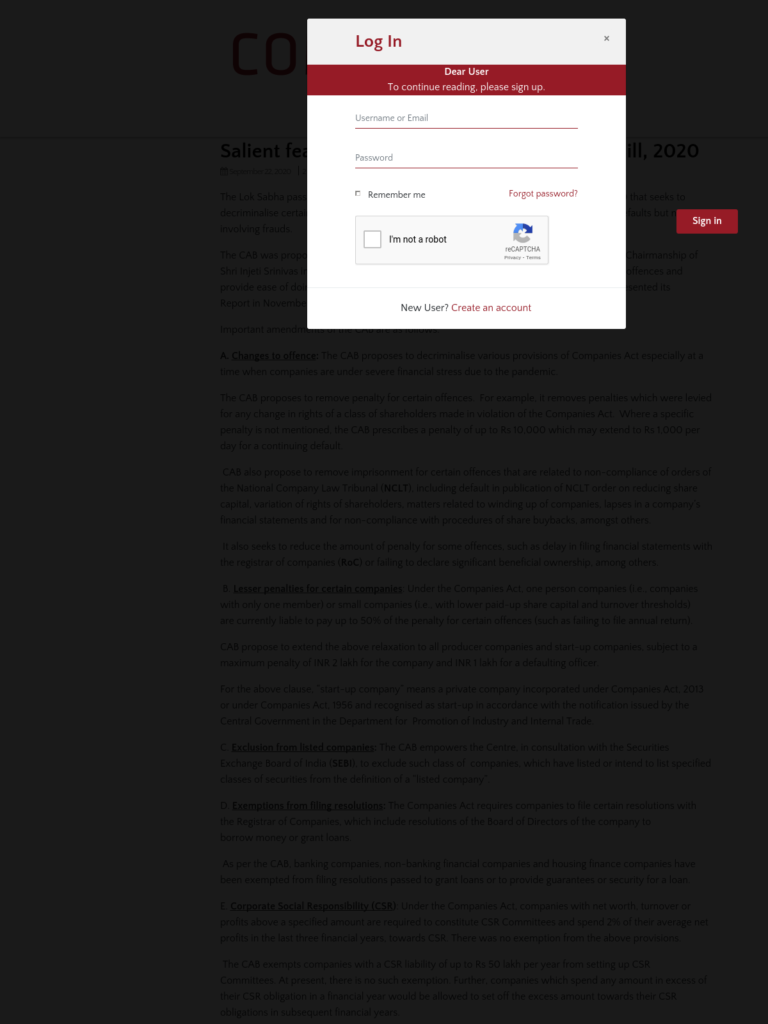Salient features of Companies (Amendment) Bill, 2020
Blog: NASSCOM Official Blog
The Lok Sabha passed the Companies (Amendment) Bill, 2020 (CAB) on September 19, 2020 that seeks to decriminalise certain offences under the Companies Act, 2013 (Companies Act), in case of defaults but not involving frauds.
The CAB was proposed by the Company Law Committee (CLC) which was set up under the Chairmanship of Shri Injeti Srinivas in September 2019. The CLC was constituted with a view to decriminalise offences and provide ease of doing business to the corporates and other stakeholders. The Committee presented its Report in November 2019 which provided for de-clogging 46 penal provisions.
Important amendments of the CAB are as follows:
A. Changes to offence: The CAB proposes to decriminalise various provisions of Companies Act especially at a time when companies are under severe financial stress due to the pandemic.
The CAB proposes to remove penalty for certain offences. For example, it removes penalties which were levied for any change in rights of a class of shareholders made in violation of the Companies Act. Where a specific penalty is not mentioned, the CAB prescribes a penalty of up to Rs 10,000 which may extend to Rs 1,000 per day for a continuing default.
CAB also propose to remove imprisonment for certain offences that are related to non-compliance of orders of the National Company Law Tribunal (NCLT), including default in publication of NCLT order on reducing share capital, variation of rights of shareholders, matters related to winding up of companies, lapses in a company’s financial statements and for non-compliance with procedures of share buybacks, amongst others.
It also seeks to reduce the amount of penalty for some offences, such as delay in filing financial statements with the registrar of companies (RoC) or failing to declare significant beneficial ownership, among others.
B. Lesser penalties for certain companies: Under the Companies Act, one person companies (i.e., companies with only one member) or small companies (i.e., with lower paid-up share capital and turnover thresholds) are currently liable to pay up to 50% of the penalty for certain offences (such as failing to file annual return).
CAB propose to extend the above relaxation to all producer companies and start-up companies, subject to a maximum penalty of INR 2 lakh for the company and INR 1 lakh for a defaulting officer.
For the above clause, “start-up company” means a private company incorporated under Companies Act, 2013 or under Companies Act, 1956 and recognised as start-up in accordance with the notification issued by the Central Government in the Department for Promotion of Industry and Internal Trade.
C. Exclusion from listed companies: The CAB empowers the Centre, in consultation with the Securities Exchange Board of India (SEBI), to exclude such class of companies, which have listed or intend to list specified classes of securities from the definition of a “listed company”.
D. Exemptions from filing resolutions: The Companies Act requires companies to file certain resolutions with the Registrar of Companies, which include resolutions of the Board of Directors of the company to borrow money or grant loans.
As per the CAB, banking companies, non-banking financial companies and housing finance companies have been exempted from filing resolutions passed to grant loans or to provide guarantees or security for a loan.
E. Corporate Social Responsibility (CSR): Under the Companies Act, companies with net worth, turnover or profits above a specified amount are required to constitute CSR Committees and spend 2% of their average net profits in the last three financial years, towards CSR. There was no exemption from the above provisions.
The CAB exempts companies with a CSR liability of up to Rs 50 lakh per year from setting up CSR Committees. At present, there is no such exemption. Further, companies which spend any amount in excess of their CSR obligation in a financial year would be allowed to set off the excess amount towards their CSR obligations in subsequent financial years.
F. Constitution of Appellate Tribunal: The CAB propose to constitute an Appellate Tribunal (there is no such tribunal at present) to be known as the National Company Law Appellate Tribunal consisting of a chairperson and maximum 11 Judicial and Technical members (to be nominated by Central Government) for hearing appeals against—
- orders of Tribunal or National Financial Reporting Authority under Companies Act; and
- any direction, decision or order referred to Competition Act, 2002 in accordance with the provisions of that Act].
G. Direct listing in foreign jurisdictions: Currently, companies incorporated in India cannot list on foreign stock exchanges unless they get listed in India.
The CAB proposes to empower central government to allow certain classes of public companies to list classes of securities in foreign jurisdictions. More details are awaited on this. Overseas stock exchange like the New York Stock Exchange, London Stock Exchange or the Stock Exchange of Hong Kong allow direct listing of foreign securities.
The CAB is expected to be tabled in the Rajya Sabha during the ongoing Monsoon session of the Parliament.
We hope you will find the update useful.
The post Salient features of Companies (Amendment) Bill, 2020 appeared first on NASSCOM Community |The Official Community of Indian IT Industry.
Leave a Comment
You must be logged in to post a comment.








